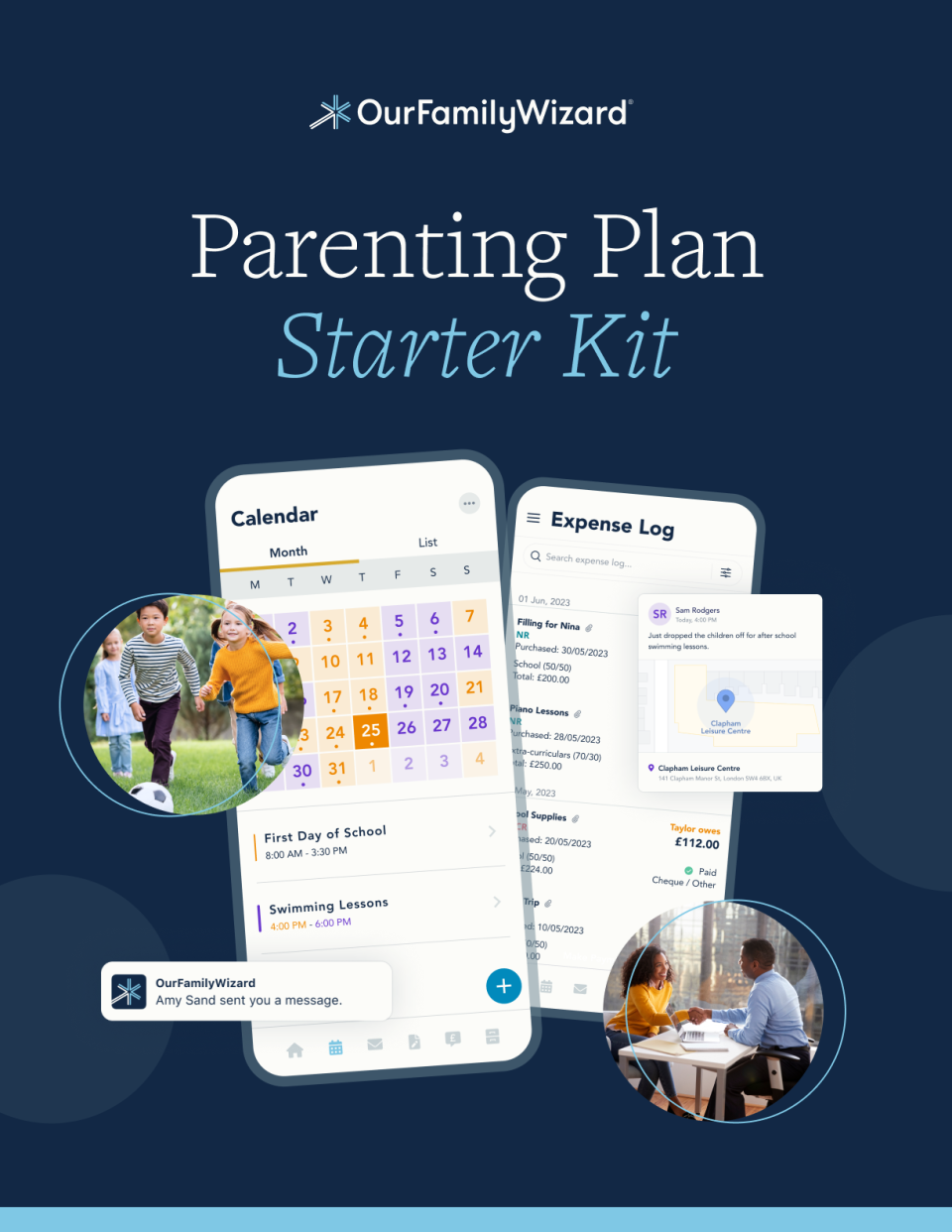How to Write a Parenting Plan
Learn how to write an effective parenting plan that works best for your child, now and in the future. Get step-by-step instructions and expert tips, along with the opportunity to download our free starter kit with a parenting plan template and more.
What is a parenting plan?
Parents going through separation or divorce must negotiate both legal and emotional issues as they prepare to create a parenting plan. They should focus on the child’s best interests using a collaborative and organized approach as they address potentially thorny decisions. A collaborative, organized approach helps.
A parenting plan establishes clear guidelines and expectations for everyone in the family for legal separation or divorce settlement agreements. It summarizes children's living arrangements, like time spent with each parent, and financial issues, like child support agreements. It also outlines procedures for making important life decisions and even modifying your plan after submission to the court.
Once the judge approves your plan, it is binding, and you and your co-parent must follow it.
While the parenting plan is part of a legal process, it's also about emotions, relationships, and the child’s health and happiness. The meta-analysis Critical Analysis of Research on Parenting Plans and Children's Well-Being Applied Research for the Family Court, published by the Oxford University Press in 2012, underscores that effective parenting plans should prioritize the child’s well-being and connections with both parents while minimizing conflict.
In fact, children are central to all the actions and agreements described in parenting plans. In "Keeping in Mind the Child's Perspective in Your Parenting Plan," published in the Chicago Bar Association's Summer 2024 Issue, the author emphasizes that children want quality time with their parents more than any specific amount of time.
Key takeaways:
- The goal of your parenting plan is to support your child's well-being.
- Start working on your plan as soon as you decide to separate.
- Communication is the essential ingredient in a successful parenting plan.
- Know the rules in your state – they vary slightly in all 50 and the District of Columbia.
- Seek professional assistance as soon as you run into roadblocks.
- Use a co-parenting app to stay in sync, stay accountable, and maintain good recordkeeping and relationships.
To create a parenting plan, start by discussing a series of checklist items. Focus on your child’s best interest and use a mediator if necessary. You’ll address issues like the custody schedule, finances, and much more. You’ll submit it to a family court, and it’s legally binding once approved.
The parenting plan will guide how parents support their child's physical needs and emotional security. Consider what will nurture your child over time to minimize the need for future modifications since the court must approve any changes. Make a parenting plan that identifies each parent's responsibilities and authority while minimizing your child’s exposure to harmful conflict.
Here are the detailed steps to create an effective parenting plan, or you can watch this video.
Step 1: Start the planning process and negotiations early
In most states, both parents must agree to the parenting plan and have it approved by the family court. The earlier you understand how to create a shared parenting plan and work together, the more likely you will experience a faster and less contentious separation or divorce.
The most successful child-focused parenting plans rely on the parents cooperating as a business-like team. "If you move into two homes and haven't shifted your negative intimacy (unhealthy interpersonal dynamics that existed in the marriage), then all you've done is further complicate your kids' lives," stresses Annette Katchaluba, MSW, RSW. She is the director of By Peaceful Waters, which offers Child Centered Divorce Services in Ontario, and she has worked with children and parents in separated situations for over 20 years.
cooperating as a business-like team. "If you move into two homes and haven't shifted your negative intimacy (unhealthy interpersonal dynamics that existed in the marriage), then all you've done is further complicate your kids' lives," stresses Annette Katchaluba, MSW, RSW. She is the director of By Peaceful Waters, which offers Child Centered Divorce Services in Ontario, and she has worked with children and parents in separated situations for over 20 years.
"When the negative intimacy does not change, I have heard children say they feel pulled between two homes or blame themselves for the ongoing conflict. They believe, ‘I am the problem because my parents are fighting about me.’ The key is to shift into a business partner relationship built on courtesy, just as you do with professional colleagues. You can work out the details if you have a goal-oriented relationship."
As you start creating your parenting plan, think about how you can:
- Keep the situation in your control: In most states, you can write your own parenting plan. Working out the details of your parenting plan early benefits everyone in the family. If the parties cannot agree on a plan or propose a plan that is unacceptable to the court, the court will establish one based on what determines your child's best interests – which means the judge will take control of your family’s future.
- Use a checklist to create a plan with sufficient detail: A parenting plan checklist can help you organize your plan. The objective is to avoid conflicts and build a future that fosters good relationships and clarity about responsibilities.
- Collaborate with your co-parent: Most states allow parents to create their parenting plans. One parent can write the plan, but both parents should collaborate on its contents. At the very least, ask your co-parent to review it and resolve disagreements as soon as possible.
- Use mediation if you need to shift how you interact: Working as a team for your child's good is essential. If you can’t agree, mediation can help.
- Have an attorney review to save time and money: If there are complex custody issues or deep disagreements between the parents, have an attorney review the plan. An attorney can ensure that your plan is sensible, legal, and aligns with what a family court judge will favor.
Step 2: Focus on your child's best interests
The "best interests of the child" is a legal standard that helps determine what’s best for a child's well-being. An effective parenting plan revolves around this principle.
Consistent, supportive relationships are the key to good parenting plans. They help make a child feel secure and experience a smoother transition to a new family structure.
They help make a child feel secure and experience a smoother transition to a new family structure.
"Too many people can't love a child, so it's wonderful when relationships with grandparents and extended family are part of the parenting plan," says Amanda Love, Principal at the Love Law Firm in Savannah, Georgia. "That said, we want to maximize quality time with each parent – unless there are major issues with challenges like substance abuse or psychological problems."
Love has 15 years of experience in family law, and her practice offers alternative dispute resolution that allows all parties, including children, to have their voices heard and needs met.
To determine a child's best interests, courts consider many factors, including:
- The child's age, gender, preferences and special needs: These factors can make a child’s needs very different from each other. For example, consider the needs of a male toddler compared with a parenting plan for a teenage girl. If the child is old enough to communicate and understand the situation, ask what they want and why. In most states, the child's preferences about where they live and other specifics depend on the child's age and the laws that govern family law in that community.
- Each parent’s caretaking ability: Think about the physical, mental and interpersonal skills you and your co-parent possess. Who best cares for your child, and in what situations?
- Relationships with parents and extended family: Kids need all the support they can get from each parent and extended family, such as grandparents and step-siblings. Make time and space for your child to relate and enjoy expanded relationships.
- Quality and stability of the home environment: The need to continue a stable home environment can dictate where the child will live most of the time. When parents share custody, they should make sure that both homes are comfortable and provide a space where the child feels secure and welcomed. Some co-parents use birdnesting, which means the child lives full time in the family home and the parents move in and out based on an agreed-upon schedule.
- The financial status of each parent: Finances are critical to creating a successful parenting plan and will help you and the court decide who will pay for essential and extraordinary expenses.
- Familiar school and community: Maintaining the status quo for school-aged children, including extracurricular activities, is usually less stressful for the child and parents.
- The parents’ personal history: If there is a pattern of domestic violence in the home, excessive discipline or emotional abuse, parental substance abuse, or a history of child abuse or sexual abuse, custody agreements that ensure the child's safety, such as supervised visitation, can be the logical solution.
- Religion and culture: When families split up, upholding cultural and spiritual traditions can be a sticking point in how to write your parenting plan. Work out these issues before submitting your plan to court. If your child is old enough, take the time to get their feedback and interest in continuing those traditions.

Step 3: Create a schedule that's realistic for your family
Your parenting schedule dictates your family's new routine. The schedule lets everyone know how much time your child will spend with you and with your co-parent. It's an essential part of your parenting plan, so find a realistic schedule that works for your family and stick to it.
"In my practice, we have been leaning toward recommending a 50/50 schedule with one week on and one week off for each co-parent," suggests Love. "That way, you know how to operate, which is especially helpful for school holidays when there is a Monday off of school."
Scheduling items to consider include:
- Review scheduling options: Choosing the right parenting schedule depends on your child's needs and those of you and your co-parent. Many mediators, attorneys, and family courts recommend plans that provide the child equal time with their parents, or a 50/50 time split, easily scheduled in various ways. To find the best parenting schedule, take advantage of Custody Navigator, a free tool that helps you plan, visualize, share, and modify scheduling plans to land on a mutually satisfactory arrangement for everyone in the family and spend the maximum time together.
- Long-distance considerations: Because of work, military service or other obligations, parents may not live close enough to have custody while kids are in school. When co-parents don’t live in the same city, it’s essential to create a long-distance parenting plan that clarifies custody and visitation. If a parent or both parents have to move, new legal agreements and documents may be necessary. When parents live in separate states or countries, courts usually award primary custody to one of the parents, and the co-parent has visitation specified and filed with the court. Make the custody and visitation plan clear when you know that distance and travel will be a scheduling issue.
- Age and change: Your parenting schedule may change to meet your child's needs as they grow and change. A younger child may do better with frequent visits with both parents, while older children may find it easier to manage less frequent changeovers.
- Holiday and special events: There may be a family tradition about where everyone meets for Thanksgiving or celebrates anniversaries. Include holiday custody schedules and other traditions/events in your planning process.
Step 4: Structure how and when you will communicate
It's easy to assume you will know how to keep in contact with your co-parent and your children. Yet once your child starts moving between homes, co-parents will benefit from a more structured form of communication between them to reduce conflict.
Katchaluba is a big advocate of structured, business-like communication. "When an issue comes up with co-parents, and I hear the argument and how negotiations break down, I say, 'Let's redo this conversation. How do we remake this conversation from a business-like perspective?’" Katchaluba says.
“We can see actual changes in the negative intimacy in the session when parents practice using business-like communication. Parents can see one another in a new way and develop new co-parenting patterns that remain in place after they have finished mediation and drafted a parenting plan.”
"And what's so fascinating is that you can repair the damage of a blow-up from five minutes ago by simply redoing the conversation properly. Do you communicate professionally at your workplace with courtesy and a goal in mind? That is exactly how you resolve issues: with a go-forward and problem-solving approach for positive interactions and outcomes."
Here are more tips for effective family communication:
- Have a solid communication plan: As part of your parenting plan, determine how you and your co-parent will stay in touch and share updates about your child, even if you are using a parallel parenting arrangement where contact is limited.
- Maintain a positive tone: An amicable, positive tone in all communications with everyone in the family reduces conflict, makes life more pleasant, and removes challenges in communicating on large and small topics.
- Don't use your child as a go-between: Don’t ask your child to call your co-parent or pass messages during home visits. Kids don't need more stress or pressure – it's your obligation to care for your child's well-being and emotions while taking an adult approach to working with your ex-spouse.
- Think about how you will stay in touch with your child: Daily phone calls or video messaging can lessen the distance between you and your child, and it is healthy and supportive.
Step 5: Think ahead about legal custody and major life decisions
Carefully consider legal custody, which is the right to make major decisions about your child’s life, such as their education, religion, and extracurricular activities. This contrasts with physical custody, which refers to where the child lives. Both legal and physical custody are key components of parenting plans.
Brad Benedetto, an attorney in Michigan and a former legal liaison at OurFamilyWizard, describes an example of a difficult legal custody issue.
OurFamilyWizard, describes an example of a difficult legal custody issue.
"It's not uncommon for children to have family backgrounds in two religions, more than one cultural background, or both," he says. "It's one of the most challenging issues for me and people I have worked with. Often, there are education, rituals, and other practices linked to a specific age, for example, a quinceañera or a bar mitzvah, that make decisions difficult. These are the times I may suggest bringing in a mediator since these matters need settling before the plan is court-approved and finalized."
Here are tips for parents facing legal custody issues in a parenting plan:
- Understand your custody options and terms: There are different child custody types to learn about, which fall into two broad categories: legal custody and physical custody. Legal custody can be joint custody or joint legal custody, meaning shared custody with both parents. Or it can be sole legal custody, with one parent having full decision-making responsibility. Physical custody can be joint physical custody, with the child spending substantial amounts of time with each parent. Or it can be sole physical custody, with the noncustodial parent typically visiting regularly.
- Consider life choices that will impact your child's life now and later: Education, medical care, religious practices, cultural influences, technology, and social media use will be significant forces in your family's life moving forward. In your parenting plan, document your initial decisions and plan how to communicate on these matters moving forward.
- Plan for emergencies: Also, plan for important decisions made in emergencies. No one wants to deal with a medical problem or school disciplinary issue, but have a plan in place so you don't add to a high-stress situation.

Step 6: Review and understand your child's financial needs and parental responsibilities
No matter how parents share legal and physical custody and parenting responsibilities, both parents are responsible for their child's finances. Child support is often court-mandated to help cover the essential living costs plus extras, which can be very important if one parent has more financial resources.
Usually, monthly child support payments cover your (biological) child's basic needs, like clothing, food, shelter, health care and education. The payments usually continue until the child graduates from high school, although sometimes higher education costs are negotiated. Generally, the court determines the amount paid based on the higher-earning parent’s income. The money goes from the higher-earning parent to the other parent as a monthly payment or through a payroll deduction. Child support does not typically exceed 45% of the higher-earning parent’s income.
Co-parents need to keep a running log of child-related expenses. Even if child support covers most of those expenses, maintaining this documentation can help each parent see what they spend on their child and budget their household spending.
Also, co-parents may share expenses, depending on their income. The expenses may include:
- Childcare: Includes expenses related to nursery tuition, daycare, and before/after school care, in or out of the home.
- Extra educational fees and tuition: Tutoring, school supplies, yearbook photos, and tuition for special programs.
- Medical and dental expenses: Health insurance premiums, copayments, prescription medications, and out-of-network care. Also, preventive dental care, procedures, treatments, and orthodontia are essential but often pricey.
- Sports and activities: Extracurricular activities like sports, camps, lessons, and clubs.
- Technology and electronics: Laptops, cell phones, earbuds, and headphones.
- Transportation: Fuel costs, parking fees, public transportation fares, airplane tickets.
- Vacations: Family trips or trips without either parent.
- Pets: Veterinary costs, pet food, supplies, and grooming.
- Extraordinary expenses: Items not covered by support payments. Use a secure, documented method to reimburse the parent who has covered the costs.
Speak with your attorney or other family law practitioners you work with for one-on-one guidance on your parenting plan.
Step 7: Design a cooperative and flexible partnership with long-term goals
Keep specific goals in mind. It can help to imagine how you want your child to reflect on this time of their life. While divorce is difficult for everyone, strive to create positive memories for your child.
"Parents may not love each other anymore. They might disagree,” Benedetto says. “But I've seen clients deal with grief and difficult situations by throwing up their hands and saying, 'I don't care, do what you want.' That won't work from a practical or emotional basis for anyone, and I believe it is fundamentally untrue."
He adds, "If there is no resolution of important ongoing issues, this stance will bring the process back to square one, and no one wants that. That's why both parties need to work together and find ways to cooperate for their own sake–but mostly for their children."
- Support your child's well-being: In most cases, both parents care deeply about their children and want a shared parenting plan that is empowering and amicable. When parents disagree, it’s best to pause and reconsider the child’s best interests. The goal is for your child to become a fully realized, independent and healthy adult.
- Build healthy relationships: Work on yourself and how you relate to your ex-spouse. Your child deserves to have a robust and healthy relationship with you and their other parent, and having a healthy co-parenting partnership builds better interactions within your family and with new spouses and extended family, too.
- Accommodate changes as your child grows: With growth comes change. While it's not easy to foresee every change, some, like progressing from childhood to adolescence, are inevitable and bring challenges. Talk with your co-parent and your child, and think about how you will support greater independence, different activities, and new ways of relating to your child as an individual. Modifying a parenting plan may become necessary as your child and your life change.

This parenting plan starter kit will help you think through the essential issues and create a parenting plan. It includes the following:
- A parenting plan template that you can fill out yourself. It will help prepare you to make an actual plan that complies with your state and family court jurisdiction.
- A parenting plan checklist to make sure you include the necessary items in your parenting plan.
- A parenting plan tip sheet to guide you through our seven-step process.
- A parenting plan example PDF for the state of Florida
- A parenting plan example PDF for the state of Georgia
Download our Parenting Plan Starter Kit
Parenting plan laws by state
Parenting plans vary significantly by state due to differences in family law policies on child custody, child support, decision-making authority, and visitation rights. Most states require a parenting plan for divorce or separation cases involving minor children.
Parents can use these state-by-state divorce and child custody resources to learn about their state’s laws and procedures. Some states offer family court links to download parenting plan templates.
Here are the main ways parenting plans may differ by state:
- Terminology: States may use different terms. For example, “joint physical custody” may be termed “shared physical custody” or “parenting time” in some states. States like New York and California commonly use "parenting time," while others may still refer to it as "visitation."
- Custody Presumptions: Some states have a presumption favoring joint custody, meaning they generally prefer arrangements where both parents share decision-making and/or physical custody. Arizona, for instance, emphasizes joint legal custody and equal parenting time, while other states might not have this presumption and may award one parent sole custody more readily.
- Required Elements: States specify different required elements in parenting plans. For example, Washington requires detailed schedules for holidays and vacations and specific provisions on how to handle future changes. Other states may be less prescriptive.
- Decision-Making Authority: In states like Texas, "joint managing conservatorship" allows both parents to make decisions, but the court may grant one parent final decision-making authority on major issues, like education or health care. In contrast, states like Oregon may divide specific decision-making responsibilities between parents in the plan.
- Parenting Schedules: Parenting schedules can vary in structure. Michigan, for instance, emphasizes consistency and requires that plans outline time spent with each parent in detail, including weekday and weekend rotations. Some states may allow looser agreements or “reasonable parenting time” that’s determined between parents.
- Relocation Rules: State laws vary in terms of relocation requirements. California, for instance, requires parents with primary custody to seek permission to relocate if it significantly affects the other parent's time. Other states, like Florida, set specific mileage limits or requirements for advance notice.
- Mediation Requirements: Many states mandate mediation before parents can go to court for a parenting plan modification. California and Oregon, for example, require parents to attempt mediation first.
When parents live in different states, consulting with an attorney makes sense since federal law, the Uniform Child Custody Jurisdiction and Enforcement Act (UCJEA), sets standards for out-of-state custody agreements.
Expert tips for making a parenting plan
To make a parenting plan, experts recommend increasing your teamwork and reducing your stress levels. Experts advise cooperation and communication at every stage of your divorce for the child’s sake and your own.
Here are more detailed tips for creating your parenting plan:
- Commit to teamwork: Decide on teamwork, no matter how contentious your relationship has been. "If you can put your conflicts aside from when you decide to separate and work through your issues, you'll save yourself heartache and stress down the road," Love says. "Once kids become teenagers, they will try to manipulate you if you're not on the same page. They are about pushing boundaries, but it's more difficult if you present a united front for your family."
- Be ready for life changes. "The first thing that I like to note in parenting plan sessions is that we can't anticipate how all our lives are going to change, but we can anticipate that there's going to be change," Katchaluba says. "So, the goal, especially if we are modifying an existing plan, is to try to make changes in keeping with the spirit of the plan."
- Anticipate conflict. "I always develop a dispute resolution plan," shares Katchaluba. "What do you do in the event of conflict? How are you going to handle those conflicts? I tell parents, 'I have a secret agenda while working on your parenting plan. And it's to look for ways that your family is inclined to get involved in conflict with one another and sort it out.'"
- Do exchanges at the child’s school: "I encourage school-based trade when the child transitions from school to the co-parent’s home,” Love says. “That way, you drop off the child and pick them up, and there's no need to meet up or have guesswork about timing."
- Use an app to facilitate communication: "Using the OurFamilyWizard app facilitates communication throughout the whole family, whether there is conflict or not, even if parents never see each other," Benedetto says. "It provides a record, and it works for every situation. Most courts accept it, and it does reduce problems."
Using these tips will reduce conflict between co-parents.
"The point of the parenting plan in a dissolution of marriage is to shield children from conflict,” Katchaluba says. “When I share the impacts on kids of a contentious parent situation, they always say that it's been the most useful part of our time together. Once they catch on to that concept, the parents can make the mental shift, evaluate, and ask, ‘Is this worth fighting about?’ And my answer is always: ’It's not.’ “
Katchaluba adds, "The literature suggests that children that go through a high-conflict separation and divorce have risk factors. And that includes suicidal ideation, eating disorders, anxiety, depression, sexual promiscuity, addictions, and truancy from school -- the list is huge. There's only one other population with the same risk factors. It is children who have been directly, emotionally, physically, and sexually abused. A solid parenting plan incorporating a low-conflict business partner relationship is foundational to a good family future."
Common parenting plan mistakes to avoid
Common mistakes in initial drafts of parenting plans include a lack of child focus, striving to “win’ arguments, and not paying attention to details.
Here’s a closer look at mistakes to avoid when making a parenting plan:
- Being stuck in the present: "A common mistake is that people will focus too much on current issues and conflict. While it's certainly important to focus on issues that need addressing right now because that's often the root of the argument in place," says Benedetto. "Parents should focus on interests rather than positions. It's also important to set the parents up for future success and get them to move forward in their thinking rather than staying mired in the present."
- Trying to win against your former spouse: "The only people who should win when it comes to parenting plans are the kids," Love stresses. "Yes, when people break up, there is conflict, but what are you winning against your former spouse? What is your win/loss ratio? Sometimes, attorneys are the only winners financially when there is no clear delineation of goals, plans or adherence. Make things clear from the beginning. If you make a parenting plan no one can agree to or has nonsensical terms, you don't know what the judge will do – and they have the final say."
- Assuming goodwill instead of spelling out details: Katchaluba says that while she advocates for cooperation and amity, co-parents should rely on clear parenting plans, not goodwill. "One of the common mistakes I see in parenting plans are those that say they will share the holidays. That's beautiful but assumes a lot of goodwill, and we need a parenting plan that suggests no goodwill. That is your default. You must have as many details in the plan as possible since that is the default if there's no goodwill. That is key as I build plans with clients."
- Obsessing over legal terms: "People often get bogged down in titles, like primary custodian," Love says. "The point is to make the most of your time with your child."
- Not addressing technology pressures. "Parents need to work together to decide when the child can have a phone, if they want to limit access to social media or specific types of material,” Love says. “As kids get into their preteen and teen years, parents need to present a united front.”
- Forgetting to proofread: Love says one of the most common – and expensive – trip-ups is not double-checking and proofreading your parenting plan. "For example, accidentally changing dates on one part of the plan may create scheduling issues for you and in the eyes of the court,” Love says. "Make sure you proof or have someone else proof. The best solution is to have an attorney review your plan to make sure it conforms to state law and has no discrepancies. That may cost a bit in the present but save a lot of time and aggravation in the future."
Easy communication & co-parenting with OurFamilyWizard
Co-parents need a convenient way to create a parenting schedule and follow through with good communication and teamwork.
The OurFamilyWizard app enables easy family communication with its calendar, messaging, video calls, expense tracking, and more. It keeps a convenient record of everything, reducing disagreements. Used by over a million parents and professionals and accepted by courts in all 50 states, it provides a secure record of your interactions. Designed for flexibility that works for various scenarios, OurFamilyWizard adapts to changes in your circumstances.
